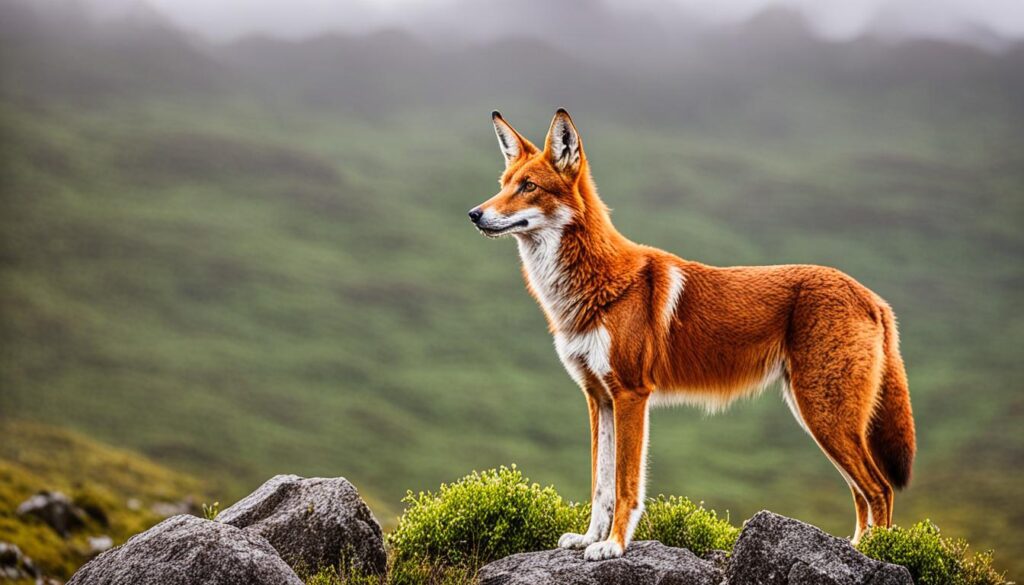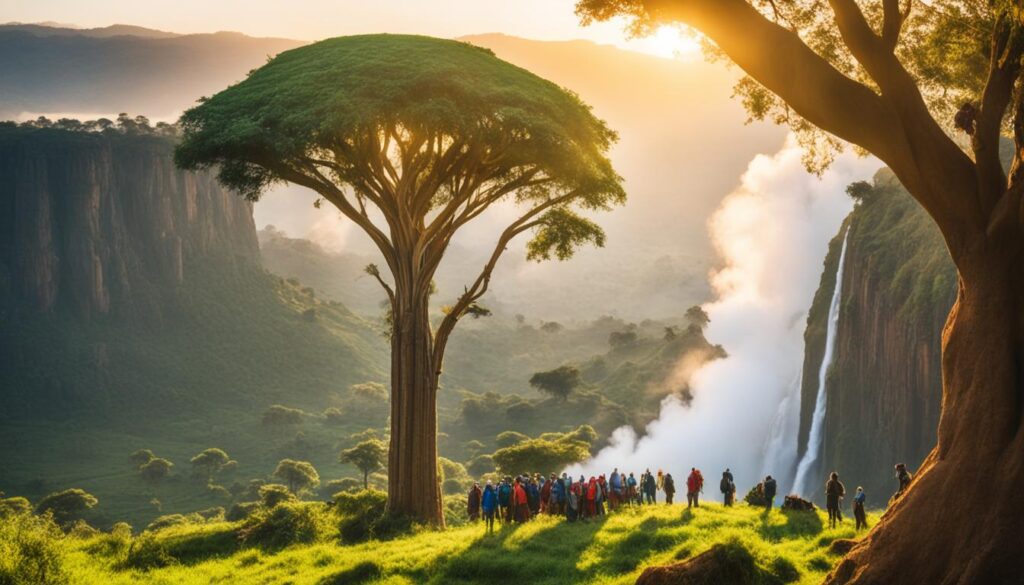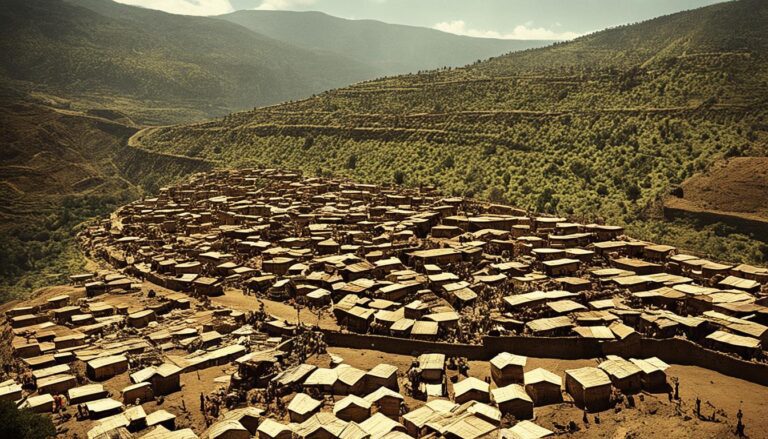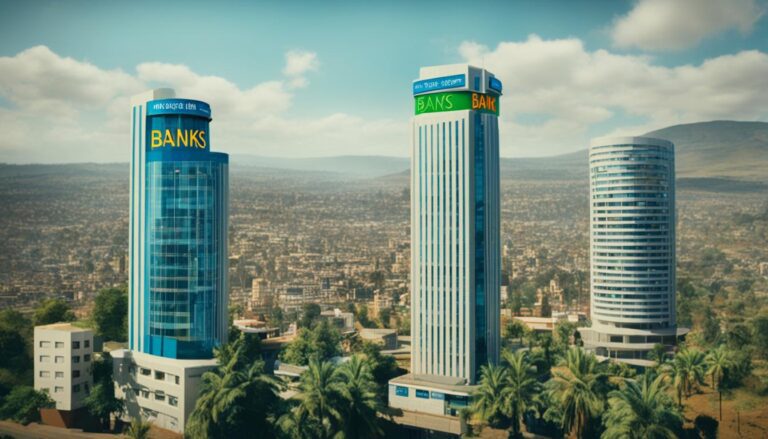Is Ethiopia Good Country?
Did you know that the World Bank Group has committed over $13.7 billion to Ethiopia to support its inclusive and sustainable growth? This astonishing statistic highlights the significant impact and potential of this East African nation. But what makes Ethiopia such a compelling destination? Let’s delve into the quality of life, cultural heritage, natural beauty, and development possibilities that make Ethiopia an intriguing country to explore.
Key Takeaways:
- Ethiopia has received significant financial support from the World Bank Group for its development initiatives.
- Ethiopia’s cultural heritage is rich and unique, with historic monuments, indigenous communities, and vibrant festivals.
- The country offers breathtaking landscapes, including the highlands, national parks, lakes, and the Danakil Depression.
- Ethiopia is home to diverse wildlife and endemic species, such as the Ethiopian Wolf and Gelada Monkeys.
- Coffee ceremonies and Ethiopian hospitality provide an opportunity to immerse yourself in the local culture.
Ethiopia’s Cultural Heritage
Ethiopia is a country rich in culture and traditions, deeply rooted in its ancient history and untouched by European colonialism. This unique heritage has shaped the Ethiopian people and society, creating a vibrant and diverse tapestry of traditions that have been preserved for thousands of years.
One of the most remarkable aspects of Ethiopia’s cultural heritage is its historic monuments. From the awe-inspiring rock-hewn churches of Lalibela, carved out of solid volcanic rock, to the grand Fasil Ghebbi fortress complex in Gondar, these architectural marvels bear testament to Ethiopia’s rich past. The ancient obelisks in Axum, some dating back over 2,000 years, stand as enduring symbols of Ethiopia’s glorious history.
But Ethiopia’s cultural heritage extends far beyond its architectural wonders. The country is home to diverse indigenous communities, each with their own unique traditions and ways of life. In the Omo Valley, for example, numerous tribes have preserved their ancestral customs, providing a window into Ethiopia’s rich cultural tapestry. From the Hamar people known for their bull-jumping ceremonies to the exquisite body art of the Karo tribe, these communities offer a glimpse into a way of life that has remained largely unchanged for centuries.
Ancient Monuments of Ethiopia
| Monument | Location | Significance |
|---|---|---|
| Rock-hewn churches of Lalibela | Lalibela | A UNESCO World Heritage site featuring 11 monolithic churches, carved entirely out of rock, dating back to the 12th century. |
| Fasil Ghebbi | Gondar | A fortress complex showcasing Ethiopian architecture with influences from the Middle East and Europe. |
| Axum Obelisks | Axum | A collection of ancient obelisks and ruins that speak to the once-great Axumite Empire. |
Diverse Indigenous Communities of Ethiopia
Ethiopia’s indigenous communities are living embodiments of the country’s cultural heritage. They offer a glimpse into ancient traditions, rituals, and ways of life that have endured for generations. Here are some of the remarkable indigenous tribes of Ethiopia:
- The Hamar tribe, known for their distinctive bull-jumping ceremonies marking the transition of young men into adulthood.
- The Karo tribe, renowned for their intricate body painting traditions, using natural pigments to create stunning patterns.
- The Mursi tribe, recognized for their characteristic lip plates, a visual expression of beauty and cultural identity.
“Ethiopia’s cultural heritage is a treasure trove of ancient wisdom, artistry, and connection to the past. It is a testament to the resilience and pride of the Ethiopian people.”
Exploring Ethiopia’s cultural heritage is not just an opportunity to witness ancient traditions but also to connect with the warm and hospitable Ethiopian people. Their vibrant culture and traditions offer a welcoming invitation to visitors, providing a memorable and enriching experience for those who are fortunate enough to partake.
Natural Beauty of Ethiopia

Ethiopia is a country blessed with awe-inspiring landscapes that captivate the hearts of nature lovers. From majestic mountains to stunning waterfalls, Ethiopia’s natural attractions are a must-see for any traveler. Let us take you on a journey through some of the most breathtaking tourist attractions that Ethiopia has to offer.
Ethiopian Highlands: Simien Mountains and Bale Mountains National Park
The Ethiopian highlands are renowned for their majestic beauty. The Simien Mountains, a UNESCO World Heritage Site, are characterized by dramatic cliffs, deep valleys, and unique wildlife. Trekking through the Simien Mountains offers breathtaking views and the chance to encounter rare animals such as the Ethiopian wolf and Gelada baboons.
Bale Mountains National Park, another jewel of the Ethiopian highlands, is home to diverse ecosystems and endemic wildlife species. Visitors can explore its vast network of trails, witness the beauty of alpine lakes, and spot endangered Ethiopian Mountain Nyala and Bale monkeys.
Danakil Depression: Land of Extraordinary Landscapes
The Danakil Depression is a geological wonder that showcases otherworldly landscapes. This scorching desert region features lava lakes, sulfur springs, salt flats, and even active volcanoes. The vibrant colors and unique formations make it an incredibly captivating destination for adventurous travelers.
Blue Nile Falls: “The Smoking Water”
Located near the town of Bahir Dar, the Blue Nile Falls, also known as “The Smoking Water,” is a dramatic waterfall that will leave you in awe. As one of Ethiopia’s most iconic natural landmarks, these falls cascade down a series of steps, creating a mesmerizing display of cascading water and rainbows.
Picturesque Lakes: Nature’s Reflections
Throughout Ethiopia, you’ll find a myriad of stunning lakes that offer tranquility and picturesque scenery. Lake Tana, the largest lake in Ethiopia, is not only known for its natural beauty but also for its ancient monasteries. Lake Ziway, Lake Langano, and Lake Awassa are also popular destinations for boating, birdwatching, and relaxing by the shore.
Immerse yourself in Ethiopia’s natural wonders and experience the breathtaking beauty that awaits at every corner. The stunning landscapes, diverse ecosystems, and unique geological features make Ethiopia a paradise for nature enthusiasts.
Wildlife and Biodiversity in Ethiopia

Ethiopia is a biodiverse country with a rich array of wildlife and unique ecosystems. From the breathtaking landscapes of the Bale Mountains to the majestic Simien Mountains, Ethiopia is home to a diverse range of endemic species.
One of Ethiopia’s most renowned wildlife treasures is the Ethiopian Wolf. This remarkable canid is one of the rarest wolves in the world and can only be found in Ethiopia, particularly in the Bale Mountains. With its russet-red fur and elegant stature, the Ethiopian Wolf is a symbol of Ethiopia’s commitment to conservation and protecting its natural heritage.
But the Ethiopian Wolf isn’t the only iconic species that calls Ethiopia home. The Simien Mountains are the habitat of the Walia Ibex, a majestic mountain goat known for its impressive curved horns. These mountains also provide a sanctuary for the Gelada Monkeys, endemic to Ethiopia and recognized for their unique cultural behaviors.
Gambella National Park is another wildlife haven, offering sightings of elephants, zebras, and giraffes. These magnificent animals roam freely in their natural habitat, providing visitors with an unforgettable experience in the heart of Africa.
Not to be forgotten are Ethiopia’s stunning lakes, which foster a diversity of wildlife. Lakes like Lake Tana, Lake Awassa, and Lake Chamo teem with life, including crocodiles, hippos, and an array of bird species. These lakes serve as important feeding and breeding grounds for numerous native and migratory birds, offering birdwatchers a captivating spectacle.
Ethiopia’s commitment to preserving its wildlife and biodiversity is evident through the establishment of national parks and protected areas. These conservation efforts not only serve to safeguard the unique flora and fauna of the region but also promote sustainable tourism, allowing visitors to witness the beauty of Ethiopia’s natural world firsthand.
Festivals and Celebrations in Ethiopia
Ethiopia is known for its vibrant festival calendar, which showcases the country’s rich cultural traditions. These celebrations provide a unique opportunity for visitors to immerse themselves in Ethiopian culture and witness the colorful festivities and traditional ceremonies that bring the country to life.
Ethiopian Christmas
One of the most significant festivals in Ethiopia is Ethiopian Christmas, locally known as Genna or Lidet. Celebrated on January 7th, according to the Ethiopian Orthodox Church’s calendar, this festival commemorates the birth of Jesus Christ. The day is marked with church services, feasts, and the traditional game of Genna, which resembles hockey.
Timket
Timket, also known as the Feast of Epiphany, is another major celebration in Ethiopia. It takes place on January 19th and commemorates the baptism of Jesus in the Jordan River. The festival involves colorful processions, religious ceremonies, and the reenactment of the baptism, where participants immerse themselves in holy water as a symbol of purification.
Enkutatash
Enkutatash, meaning “Gift of Jewels,” is the Ethiopian New Year and falls on September 11th. This joyous celebration marks the end of the rainy season and the beginning of the new harvest. It is characterized by traditional music, dancing, and the exchanging of gifts and flowers. Families also gather to enjoy festive meals, including the famous Ethiopian cuisine.
Meskel
Meskel, celebrated on September 27th, is a religious festival that commemorates the discovery of the True Cross by Queen Helena, the mother of Emperor Constantine. The festival involves the lighting of a large bonfire called Demera, where people gather to sing, dance, and pray. Meskel is known for its vibrant atmosphere and is celebrated with great enthusiasm throughout Ethiopia.
The Adwa Celebrations
The Adwa Celebrations hold immense historical significance in Ethiopia. They commemorate Ethiopia’s victory against Italian forces on March 1, 1896, in the Battle of Adwa. This victory symbolizes Ethiopia’s resilience and the preservation of its independence. The celebrations feature parades, cultural performances, and storytelling sessions that highlight the country’s spirit and heritage.
These festivals and celebrations not only offer a glimpse into Ethiopia’s rich culture and traditions but also create lasting memories for visitors. Whether it’s witnessing the vibrancy of Ethiopian Christmas or experiencing the joy of Enkutatash, these cultural events showcase the pride and heritage of the Ethiopian people.
Coffee Ceremonies in Ethiopia
Coffee holds a special place in Ethiopian culture, as the country is the birthplace of coffee. Coffee ceremonies are an important part of Ethiopian hospitality, where guests are treated to the traditional process of roasting and brewing coffee. These ceremonies are not only a chance to enjoy delicious coffee but also an opportunity to connect with the local culture and experience the warmth and generosity of Ethiopian people.
During a coffee ceremony, a woman known as the ebonchale (coffee woman) conducts the ritual. The ceremony usually takes place in a traditional Ethiopian home or coffee house, where the aroma of freshly roasted coffee fills the air.
The process begins with green coffee beans being roasted over an open flame. As the beans crack and release their aroma, the ebonchale stirs them in a pan. The roasted beans are then ground using a traditional mortar and pestle, creating a coarse powder.
Next, the coffee grounds are placed in a traditional clay coffee pot called a jebena. The jebena is filled with water and heated over a charcoal stove. As the water boils, the rich, flavorful coffee steeps.
Once the coffee is ready, it is poured from the jebena into small, handle-less cups called ceramic. The coffee is served in three rounds, known as abol, tana, and baraka, each with its own unique flavor and intensity.
The coffee ceremony is not just about the coffee itself, but also about the communal experience and the sense of belonging. It is a time for friends, family, and neighbors to come together, share stories, and forge connections.
Participating in a coffee ceremony is a wonderful way to immerse yourself in Ethiopian culture and traditions. It gives you a glimpse into the daily lives of the Ethiopian people and allows you to experience their warm hospitality firsthand.
A Taste of Ethiopian Coffee
Adventure and Exploration in Ethiopia

When it comes to adventure and exploration, Ethiopia is a playground of endless possibilities. The country’s diverse landscapes and natural wonders offer thrilling experiences for outdoor enthusiasts. From hiking in the majestic Simien Mountains to trekking through the highlands around Lalibela, Ethiopia is a haven for those seeking adrenaline-pumping adventures.
One of the highlights for adventure seekers is the Danakil Depression, a surreal and otherworldly landscape that will leave you in awe. With its colorful sulfur springs, volcanic activity, and salt flats, the Danakil Depression offers a truly unique and unforgettable expedition.
Gambella National Park is another must-visit destination for wildlife enthusiasts. Home to elephants, zebras, and giraffes, this park provides the opportunity to witness Africa’s majestic wildlife up close.
To ensure a safe and enjoyable adventure in Ethiopia, it is crucial to prioritize safety. When venturing into remote areas, it is advisable to travel with a reputable guide or tour operator who is familiar with the region. It is also essential to be prepared for the unique challenges and conditions that may arise during your exploration.
Whether you’re a thrill-seeker or a nature lover, Ethiopia offers an abundance of adventure and exploration. So pack your bags, embark on a journey of a lifetime, and discover the captivating beauty that awaits you in Ethiopia.
Challenges and Realities of Traveling in Ethiopia
When embarking on a journey to Ethiopia, it is essential to be aware of the challenges and realities that come with traveling in this beautiful country. While Ethiopia offers a wealth of cultural treasures and stunning landscapes, it is still developing its tourism infrastructure, which can present certain obstacles along the way.
Infrastructure Development
As Ethiopia continues to grow as a tourist destination, it is important to note that the country’s tourism infrastructure is still in its early stages of development. While there are luxury lodges and hotels available in specific areas, it is not uncommon to encounter maintenance issues. Therefore, it’s advisable to be prepared for occasional inconveniences and to keep a flexible mindset while traveling in Ethiopia.
Access to Amenities
Outside of major towns in Ethiopia, access to essential amenities such as electricity, hot water, and reliable internet connection may be limited. It is crucial to understand this reality and plan accordingly, ensuring that you have alternative means to stay connected and prepared for possible inconveniences.
Traveling Safely
While Ethiopia is generally a safe country to visit, it is always wise to prioritize personal safety. When exploring remote areas, it is recommended to travel with a reliable tour operator who understands the local conditions and can provide guidance to ensure a safe and enjoyable journey. Familiarize yourself with the local customs and traditions to show respect and avoid any unintentional misunderstandings.
“Traveling in Ethiopia comes with its own set of challenges and realities, but with proper planning and an open mind, it can be an incredibly rewarding experience.”
Being Prepared for Unpredictability
Traveling in Ethiopia may involve navigating unexpected situations or changes in plans. It is essential to approach your journey with flexibility and adaptability, embracing the unpredictability that often comes with exploring a country in its early stages of tourism development. By embracing the unknown, you open yourself up to memorable experiences and beautiful surprises along the way.
Tips for Traveling in Ethiopia
| Tip | Description |
|---|---|
| 1 | Travel with a reliable tour operator familiar with local conditions. |
| 2 | Be prepared for occasional maintenance issues at accommodations. |
| 3 | Carry alternative means of communication and power sources. |
| 4 | Respect local customs and traditions to ensure positive interactions with the local community. |
| 5 | Stay updated on travel advisories and follow safety guidelines. |
| 6 | Embrace the spontaneity and be prepared for unexpected changes in plans. |
By keeping these tips in mind and adjusting your expectations, you can navigate the challenges and realities of traveling in Ethiopia and fully enjoy the unique experiences this captivating country has to offer.
The People of Ethiopia
The Ethiopian people are known for their hospitality, warmth, and friendliness. As a visitor, you will be welcomed with a smile and genuine interest in your story. The diverse ethnic groups and indigenous tribes of Ethiopia add to the richness of its culture.
“Ethiopia’s cultural diversity is truly captivating. Interacting with local communities and learning about their way of life can be a truly enriching experience,” says Sarah Davidson, a travel enthusiast who recently explored Ethiopia’s cultural heritage.
“I was amazed by the kindness and generosity of the Ethiopian people. They shared their traditions and customs with me, making me feel like a part of their community. It was a humbling experience,” Sarah adds.
From the Oromo and Amhara in the highlands to the Afar and Sidama in the south, each group has its own traditions, languages, and customs. The rich tapestry of cultures creates a vibrant mosaic that is a testament to the harmonious coexistence of different ethnicities in Ethiopia.
Indigenous Tribes and Their Way of Life
Aside from the diverse ethnic groups, Ethiopia is also home to indigenous tribes with unique traditions that have been passed down through generations. From the Mursi with their distinctive lip plates to the Hamar known for their bull-jumping ceremonies, visiting these tribes provides a glimpse into ancient practices and rituals.
“Meeting the tribes in the Omo Valley was an eye-opening experience. Their way of life, untouched by modernization, is a testament to the strength and resilience of human culture,” reflects James Thompson, a cultural enthusiast who immersed himself in Ethiopia’s indigenous communities.
Engaging with local communities, participating in traditional dances, and witnessing age-old ceremonies offer visitors the opportunity to appreciate the beauty of Ethiopia’s living heritage.
The Spirit of Unity and Pride
Despite the diversity of cultures and languages, a strong sense of unity and national pride binds the Ethiopian people together. The history of their resistance against colonization and their determination to preserve their cultural identity has fostered a collective spirit of resilience.
“Ethiopians are proud of their heritage and history. They take great pride in sharing their traditions and stories with visitors, and their enthusiasm is contagious,” says Maria Rodriguez, a cultural enthusiast who explored Ethiopia’s festivals and celebrations.
Whether it’s the joyful processions of Timket or the vibrant dances during Meskel, Ethiopia’s festivals and celebrations showcase the shared pride and spirit of the Ethiopian people.
“It is through understanding and appreciation of different cultures that we enrich our own lives. Ethiopia has so much to offer in terms of culture and traditions,” concludes Sarah Davidson.
Ethiopia’s Potential for Development
Ethiopia is a country with great potential for development, striving to enhance the quality of life for its citizens. Through the efforts of organizations like the World Bank Group, significant investments have been made in key sectors such as education, agriculture, and healthcare. These investments, totaling over billions of dollars, aim to build a strong foundation for progress and prosperity.
Efforts are underway to promote inclusivity, gender equality, and economic transformation. This includes initiatives to improve access to education and healthcare services, empower women, and foster sustainable economic growth. By prioritizing these areas, Ethiopia is positioning itself for a brighter future.
While the journey towards development is not without challenges, Ethiopia remains committed to overcoming obstacles with resilience and determination. Key areas of focus include infrastructure development, job creation, and poverty alleviation, all aimed at improving the overall well-being of the Ethiopian people.
By harnessing its natural resources, investing in human capital, and fostering a culture of innovation, Ethiopia is paving the way for sustainable growth and development. The country’s rich cultural heritage and diverse landscapes provide a solid foundation for tourism and other sectors that contribute to its economic growth.
With a proactive approach to development and a clear vision for the future, Ethiopia is on an upward trajectory. As the country continues to build on its strengths, it holds the potential to become a leading example of progress in Africa.
Conclusion
After exploring the wonders of Ethiopia, we can confidently say that it is indeed a good country to visit. With its breathtaking landscapes, rich cultural heritage, and warm hospitality, Ethiopia offers a travel experience like no other. Whether you’re a history enthusiast, nature lover, or someone seeking cultural immersion, Ethiopia has something special to offer.
From the ancient rock-hewn churches of Lalibela to the stunning Simien and Bale Mountains, Ethiopia’s historic monuments and majestic landscapes never cease to amaze. The country’s vibrant festivals and celebrations provide a glimpse into its diverse and vibrant culture, while coffee ceremonies offer a chance to connect with the local tradition and experience ethiopia culture and traditions.
While there may be challenges and realities to consider, such as limited tourism infrastructure and intermittent access to modern amenities, the rewards of exploring Ethiopia far outweigh these obstacles. As the country continues to invest in development and improvement, the potential for a better quality of life and travel experiences increases with each passing day.
So, if you’re planning your next adventure, let Ethiopia be your guide. With its unique blend of natural beauty, cultural richness, and potential for development, you won’t be disappointed. Embrace the warmth of Ethiopian hospitality, immerse yourself in its fascinating history and traditions, and create memories that will last a lifetime.







